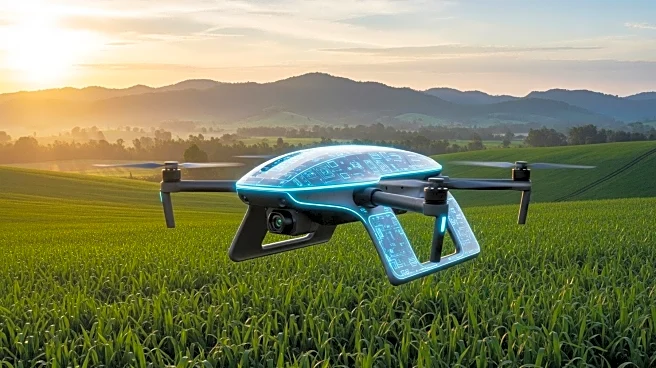What's Happening?
Syngenta has announced a series of AI-driven solutions at its flagship developer conference, DevCon 2025, held in Pune and across global platforms. The event gathered over 200 developers, engineers, and technology leaders to discuss precision agriculture innovations. Syngenta's AI initiatives focus on satellite imagery analysis, predictive modeling for crop diseases, pest management, and intelligent irrigation systems. These technologies are tailored to address the diverse challenges faced by Indian agriculture, such as climate resilience and post-harvest losses. The company is deploying AI-powered advisory platforms in regional languages to make farming knowledge accessible to smallholder growers, offering personalized recommendations for pest identification, crop health prediction, and climate-smart advisories.
Why It's Important?
The introduction of AI-driven solutions by Syngenta is significant for the agricultural sector, particularly in India, where farmers face numerous challenges. By leveraging AI, Syngenta aims to empower farmers with tools that enhance productivity and sustainability. The use of AI in agriculture can lead to improved crop management, reduced post-harvest losses, and better market access for farmers. This aligns with global trends, as PwC projects AI will add $15.7 trillion to the global economy by 2030, and MarketsandMarkets forecasts a 24.1% CAGR growth in agricultural AI adoption. These advancements could transform farming practices, making them more efficient and environmentally friendly.
What's Next?
Syngenta's AI initiatives are expected to continue evolving, with further integration of technology into farming practices. The company may expand its AI-powered advisory platforms to more regions, enhancing accessibility for farmers. As AI adoption grows, stakeholders such as government agencies, agricultural businesses, and tech companies might collaborate to support these innovations. The focus will likely remain on addressing local agricultural challenges, improving sustainability, and increasing food security. Continued investment in AI research and development could lead to new breakthroughs in precision agriculture.
Beyond the Headlines
The deployment of AI in agriculture raises ethical and cultural considerations, particularly regarding data privacy and the impact on traditional farming practices. As AI systems become more prevalent, there may be concerns about the displacement of human labor and the need for farmers to adapt to new technologies. Additionally, the focus on AI-driven solutions highlights the importance of digital literacy and access to technology in rural areas. Long-term, these innovations could lead to shifts in agricultural policy and practices, emphasizing sustainability and resilience.









